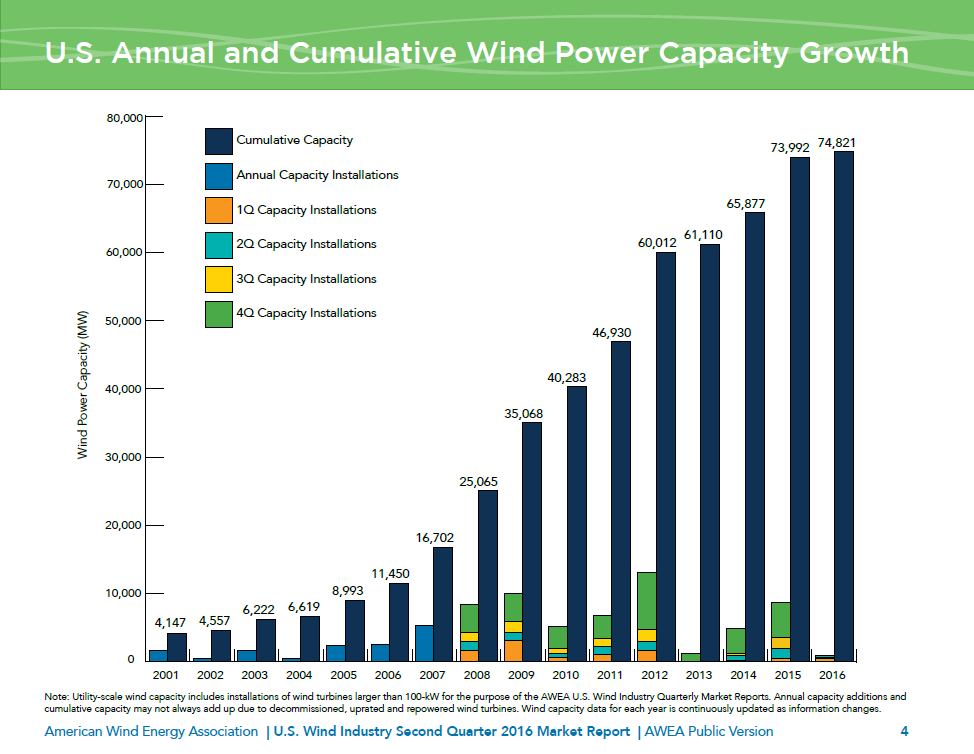By
Samantha Page, Climate Reporter at @ThinkProgress.
The five-turbine, 30-megawatt Block Island Wind Farm — providing
enough electricity to power roughly 18,000 homes for a year — is not going to
overhaul the state’s electricity supply, but it is a powerful step forward for
Rhode Island and for the country.
That’s because the electricity sector produces roughly a
third of U.S. emissions. If the country wants to meet its emissions reduction
goals as part of a global effort to curb climate change, transitioning from
fossil fuel-powered electricity generation to clean resources such as wind is
critical to that effort.
In addition, the cost of wind energy has decreased dramatically, making it one of the most cost-effective means of electricity generation.
In addition, the cost of wind energy has decreased dramatically, making it one of the most cost-effective means of electricity generation.
Calling the project’s completion “a watershed moment,”
the director of the Sierra Club’s Beyond Coal campaign congratulated Deepwater
Wind. “As America’s first offshore wind farm, we see Block Island Wind Farm as
landmark for a better, cleaner energy future, and we happily congratulate everyone
involved in making it happen,” Mary Anne Hitt said in a statement.
“Our untapped offshore wind energy potential is enormous and it holds the key to creating thousands of good paying clean energy careers, cleaning up the dangerous fossil fuel pollution endemic in many our coastal cities, and provides another effective solution to addressing the climate crisis,” she said.
“Our untapped offshore wind energy potential is enormous and it holds the key to creating thousands of good paying clean energy careers, cleaning up the dangerous fossil fuel pollution endemic in many our coastal cities, and provides another effective solution to addressing the climate crisis,” she said.
The project was made possible largely with the support
of the state, which has a decade-old renewable energy standard of 16 percent by
2019.
In an effort to meet that goal, the state identified an area in state waters near Block Island to auction for development.
In addition the Bureau of Ocean Energy Management has identified two blocks in federal waters, the Rhode Island/Massachusetts Wind Energy Area, that could ultimately provide 3,000 megawatts of wind power generation.
In an effort to meet that goal, the state identified an area in state waters near Block Island to auction for development.
In addition the Bureau of Ocean Energy Management has identified two blocks in federal waters, the Rhode Island/Massachusetts Wind Energy Area, that could ultimately provide 3,000 megawatts of wind power generation.
According to the American Wind Energy Association, an
industry group, there are 13 offshore wind projects under development now in
the United States, with nearly 6,000 megawatts of capacity set to come online
in the coming years.
“Combined with 18 gigawatts of land-based wind energy
that’s currently under construction or in the advanced stages of development,
that’s enough clean electricity to power millions of American homes,” the group
said.

The
wind industry has grown nine-fold in the past decade. CREDIT: AWEA
Overall, 371 million megawatts of wind generation
accounted for close to 5 percent of the world’s electricity in 2014, according
to the most recent data from the International Energy Agency.
Still, only 1 percent of that generation came from offshore installations, despite the fact that offshore wind power is more reliable and stronger than onshore.
Still, only 1 percent of that generation came from offshore installations, despite the fact that offshore wind power is more reliable and stronger than onshore.
The Block Island project is part — belatedly — of a
growing global trend. The announcement comes just a week after the U.K. approved phase
two of what will be the world’s largest wind farm, a 540-turbine, 3-gigawatt
installation in the North Sea.
Other countries are even further along. In 2015, Denmark
got nearly
half of its electricity from offshore wind generation.
Specifically, growing the United States’ offshore wind
portfolio makes geographical sense: 80 percent of
the country’s electricity demand is from coastal states.
Samantha Page, Climate Reporter
at@ThinkProgress. Send your hot
earth tips tospage@thinkprogress.org